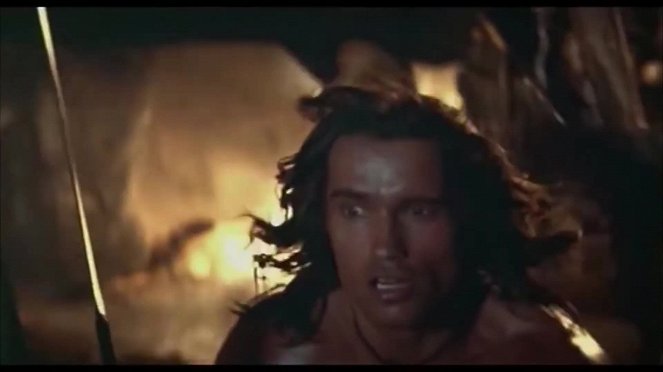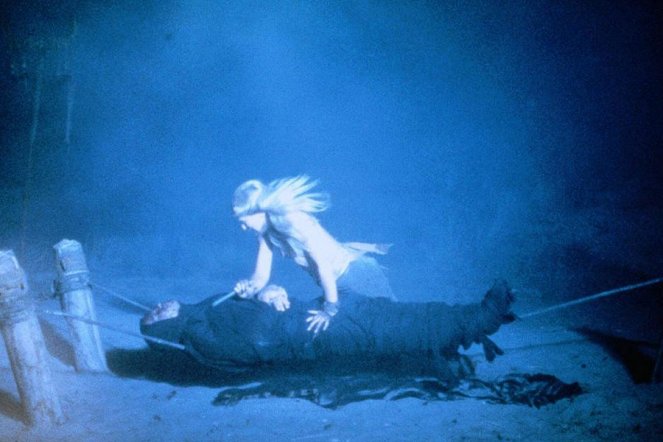Directed by:
John MiliusCinematography:
Duke CallaghanComposer:
Basil PoledourisCast:
Arnold Schwarzenegger, James Earl Jones, Max von Sydow, Sandahl Bergman, Ben Davidson, Mako, Valérie Quennessen, William Smith, Franco Columbu, Jorge Sanz (more)VOD (1)
Plots(1)
Young Conan's parents are murdered by a horde of vicious warriors who then enslave the young child for years. He is eventually released from slavery and taught the ancient arts of fighting. Transforming himself into a killing machine, Conan travels into the wilderness seeking vengeance on the man responsible for his family's murder. (official distributor synopsis)
(more)Videos (1)
Reviews (11)
I just now realized that I've never actually seen the whole of Conan the Barbarian. I only remember the movie up to the point where they steal the Eye of the Snake, but after that, I don't remember anything. I finally corrected my mistake and I must say that I enjoyed the film a lot. Excellent characters, great music, a fantastic setting, and effects that are excellent in places. And a pretty classic Conan story to boot.
()
Arnie in a strong silent type role that he was born for, supported by the unforgettable, atmosphere creating music by Basil Poledouris (one of the best cases of linking music and picture that I have ever heard/seen). And in fact, almost all the characters are silent. And in the end, isn’t this better than the empty prattling that we know from most movies nowadays? And that isn’t just my nostalgic blindness speaking, from the days when I watched Conan’s movie adventures for the first time. To this day I remember hassling my father for a whole week to record it on VHS. Not to speak of the delight I felt when at last I got my hands on a DVD version, so I could watch it in the original format and with the original English language soundtrack. One of the movies that was murdered by the 4/3 format. P.S.: I’m pleased that I’m not the only one to notice that some scenes seem like they came straight out of Alexander Nevsky. ♫ OST score: 5/5
()
The first quarter of an hour is an excellent prologue. But then that prologue never ends and the film turns out to be a two-hour, dull and lifeless, albeit visually impressive music video set to Basil Poledouris’s exceptional soundtrack. A film in which every shot lasts five times longer than was really necessary.
()
A solidly shot, grand-looking fantasy film, with a stunning production design and one of the best musical scores. Basil Poledouris created a captivating epic music that ranks among the highest peaks of his work. The legendary Arnie is fairly bearable as Conan, he looks better in the fight scenes than in the dialogues, but that is nothing new.
()
The first Conan film was a hit in its time and kicked off a wave of fantasy movies in the 1980s. However, none of the films that followed achieved similar success and if they enjoy any popularity today, it is as campy artifacts watched ironically. By comparison, Conan the Barbarian may seem slightly dated in its pacing today, but it is still fascinating thanks to its unique take on not only the heroic fantasy genre, but also its most iconic character. Unsurprisingly, the reason for this is the director and screenwriter, John Milius, who was lauded by Spielberg, Lucas and Coppola as the best storyteller of the New Hollywood generation. Milius created a reticent epic told primarily through images and the phenomenal myth-making music of Basil Poledouris. When the characters do express themselves verbally, it is mainly through monologues laden with melancholic poeticism (Osric, Valerie) or raw philosophy (Thulsa). As indicated by one of the film’s few dialogue scenes, as well as by a rare light-hearted exchange between Conan and Subotai, Milius peppered the narrative with vulgar theology and based the whole ethos of barbaric heroism on the opposition between the human and divine worlds. The main storyline thus inevitably leads to the brutally manual overthrow of the demigod who controls the minds of his followers. Milius’s Conan is no virtuous hero, but rather a properly superficial hedonist. Though we see him in a sombre thinker’s pose a few times during the film, behind his expression we sense emptiness rather than existential depth. His life is dedicated to instant gratification and mindless, brutal revenge, not to contemplating life or the death that he sows. It’s possible to draw the conclusion that the acting performances criticised by some are an intentional part of Milius’s uncompromising vision of a coherent pagan world. Conversely, the casting of the individual characters proves to be wonderfully ambitious and accurate in terms of type – from the elephantine non-actors and the statuesque though not superficially attractive women to the impressively multifaceted James Earl Jones. At its core, Conan the Barbarian is a typically Miliusian and thus a fiercely obstinate and insolently shallow rebuff of the high-concept blockbusters of the New Hollywood, while being not only a contemporary of such films, but also one of them. It belongs among them not only due to its director’s resumé and connections, but also as a creatively distinctive modern revitalisation of an old genre. Except Milius doesn’t look at old adventures with naïve nostalgia like Spielberg or Lucas and he doesn’t want to create modern equivalents of captivating flicks with swashbucklers in the mould of Errol Flynn. Instead, he serves viewers a brutal barbarian epic with a clumsy conqueror who was destined to become king (of Hollywood) through his own efforts. ___ PS: Not to mention the fact that Milius conceived Conan the Barbarian for the cinema. His raw epic about the clash of brute force and religion cannot be adequately put across anywhere else. Only on the big screen can one fully appreciate the film’s grandiose vignettes, which mirror the visual inspiration of (fantasy) epics ranging from Masaki Kobayashi’s Kaidan to Alexander Ptushko's Ilya Muromets in the spirit of the New Hollywood.
()
(less)
(more)



Ads